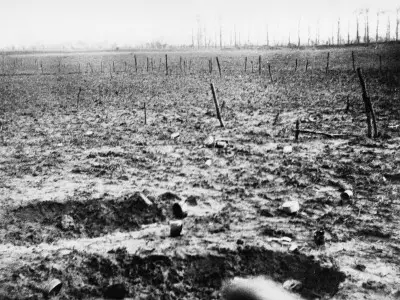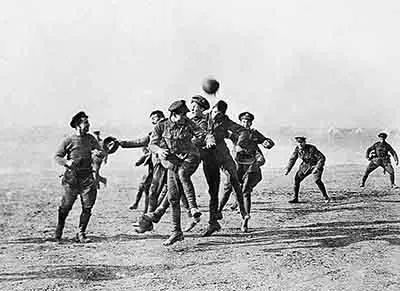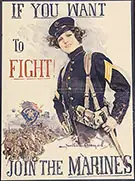Christmas Truce
In the early year of World War I, the armies were still trying to work out how to fight this new type of war. The last few months of 1914 found armies deeply entrenched in battlefields across Europe. After a few weeks of intense fighting, The English and French dug trenches to defend the land they had won. The Germans had their own trenches not far away. Between the two lines there was an area called “No Man’s Land.” This area between enemy trenches was covered with rolls of barbed wire. The wire kept soldiers from running toward the enemy on foot. Armies also planted mines in the dirt. They would explode if a horse, car or tank rolled across.


The trenches were more than just holes in the ground. They were six to eight feet deep and four to six feet wide. Wood beams supported the sides, and in some places, a roof. Soldiers would eat, sleep and drill in these trenches. The boys in the trenches got food, supplies and even mail from army support not far behind. Sharp shooters kept watch in the front trenches, ready to shoot any head that rose above the ground.
By October of 1914, the sides had become stagnant. Armies no longer tried to drive each other forward and change the battle lines. Occasional forays showed both armies that their trenches remained well defended. Leaders on both sides were working on ways to end the stalemate, but that took time. So there was little for the soldiers in the trenches to do, but wait.

October and November passed with little change until December rolled around. Then the trenches became very bad. Because they were holes, the trenches collected water in the early winter rains. As the weather become colder, the water froze into muddy ice. Soldiers slipped and slid their way through the trenches by day and froze under thin blankets at night. Soldiers on both sides were miserable.
As fall turned into winter and the days became shorter, leaving men cold and sad until December 24th, 1914, Christmas Eve.
For centuries, English French and German armies had stopped fighting on Christmas Day. This single day of truce was to celebrate the Christian holiday. The first year of World War I was no different. Leaders all across the front lines called for a truce, meaning that they would stop shooting at enemy soldiers. This gave both sides a chance to enter no man’s land. They could retrieve fallen soldiers. As they worked, many soldiers saw their enemy’s faces for the first time.

That evening German soldiers placed candles along their trenches. Some even decorated small trees with candles and colored paper to create Christmas trees. As the night fell, cold and dark, they started singing Christmas carols. The English responded by singing their own songs in return. Until finally the clock struck midnight and Christmas began. Both sides sang Silent Night together in German, English and French.
The sun rose on a day without fighting. Along the trenches, groups crossed no man’s land to meet the men they sang with. Some exchanged small gifts such as tobacco, candy or even buttons off their uniforms. Soldiers who had family behind enemy lines gave letters to enemy soldiers. They hoped to get word back to parents or loved ones. In one area, German and English soldiers picked teams and played football in the afternoon. Winners and losers laughed at the idea that they were shooting each other just a few days before.

But neither side was ready to end the war. Englishmen were not allowed near the German trenches. Germans were not allowed near the English lines. As night fell on Christmas day, both sides headed back to their camps with wishes of a Merry Christmas on their lips. After midnight, the shooting began again and the war continued.

Sadly, the Christmas Truce of 1914 was not repeated any other year of the war. Generals on both sides didn’t like the fact that soldiers made friends. Leaders in the trenches noticed that the soldiers had a much harder time killing an enemy after they had shared chocolate and games. They made rules against fraternization, or being friendly, with the enemy. In fact, in 1915, some generals ordered their troops to attack on Christmas, just to stop a repeat of the 1914 truce.
But the day lived on in letters and writings of the soldiers that were there. Soldiers who survived the war, talked about that strange, wonderful day as one of the high points of their service.



